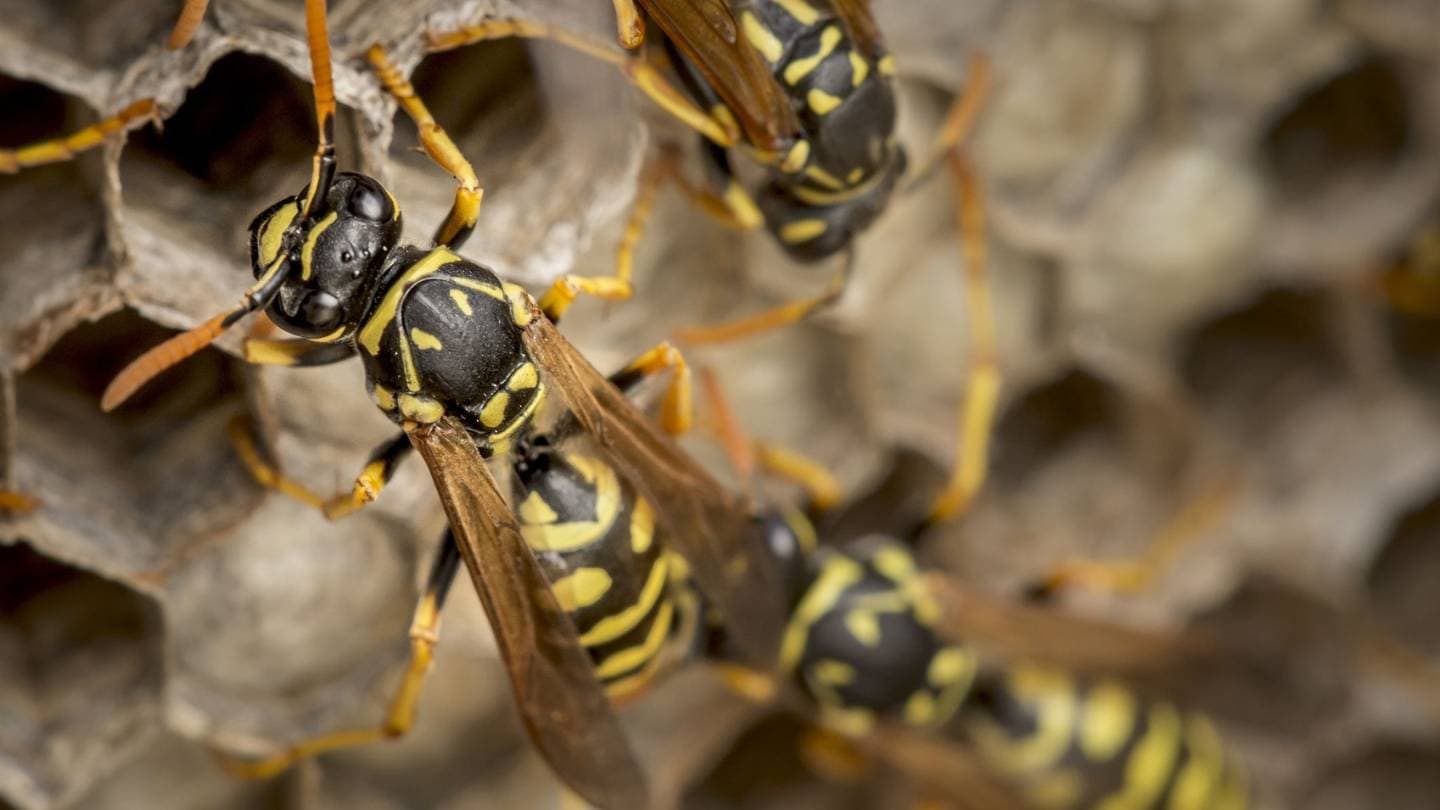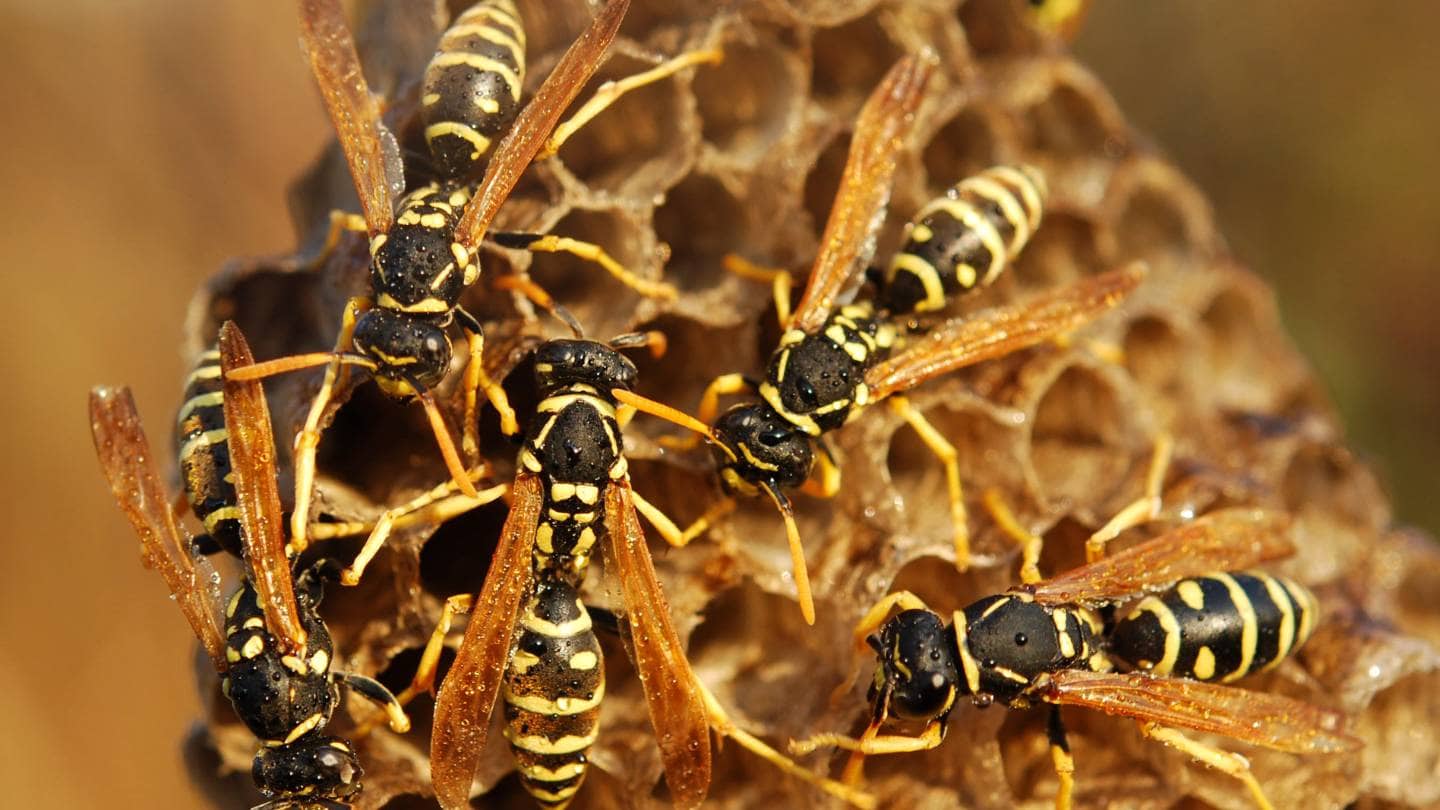Dealing with wasps can be a major concern, especially during the warmer months when these insects are most active.
Wasps in Australia are particularly aggressive and can create significant risks around homes and outdoor spaces. Their stings are painful and dangerous, especially for those allergic to wasp venom.
Preventing wasps from building nests around your home is essential to ensure the safety of your family and pets.
This article will discuss the best ways to stop wasps from making nests and how you can keep them at bay.
Let’s get straight to the point
To prevent wasps from building nests around your home, you should focus on removing potential food sources, sealing gaps in structures, and maintaining a tidy yard.
Wasps are attracted to sheltered areas like eaves, patios, and cluttered spaces. Regularly inspect and clean these areas to deter them. Natural deterrents like peppermint oil can also help.
If a nest forms, it’s safest to call a professional for removal, as wasps can be aggressive and their stings dangerous.
Consistent maintenance and preventive actions can keep wasps away, ensuring a safer outdoor environment.

Why Prevent Wasps From Building Nests?
Wasps are not just a nuisance; they can be dangerous. When wasps feel threatened, they will defend their nests aggressively.
Unlike bees, which can only sting once, wasps can sting multiple times, causing intense pain and even allergic reactions in some cases.
Wasp nest removal can also be a tricky and dangerous task once the colony is established.
Therefore, the best strategy is preventing wasps from building nests in the first place.
How Do Wasps Choose Nesting Locations?
Wasps Prefer Hidden and Protected Areas
Wasps build their nests in sheltered locations where they are protected from the elements.
These locations can include eaves, sheds, and even underground burrows. In the wild, wasps often nest in tree branches or hollow logs.
Around homes, however, they may find eaves, attics, and outdoor structures like patios and porches particularly inviting.
Nests Made of Wood Fibres
Wasps build their nests using regurgitated wood fibres, creating a papery structure that grows in size as the colony expands. Wasp nests are typically found in high places, which offer protection and security.
How Do You Stop Wasps From Building Nests?
Keep Your Trash Protected
Wasps are drawn to food, especially sugary drinks and protein sources like meat. Your garbage bins can be an attractive spot for wasps to forage.
Keep your trash cans tightly sealed and ensure that food scraps are properly disposed of.
Rinse out empty soda cans and bottles before recycling them, and regularly clean the trash bins to prevent the build-up of residue that could attract wasps.
Eliminate Food Sources
By removing food sources from your yard, you can significantly reduce the chances of wasps sticking around.
Barbecues, outdoor dining, and food scraps should be handled with care. When eating outside, cover food and clean up spills immediately. Wasps love sugary drinks, so avoid leaving them open for long periods.
Seal Gaps and Cracks in Structures
Wasps often use cracks and gaps in buildings to create their nests. To prevent this, seal any gaps in your home’s siding, roof, or around windows.
Installing vent and chimney screens can further block wasps from accessing these areas.
Regular inspections of your property can help identify potential entry points before wasps find them.
Maintain Your Yard and Garden
An overgrown yard provides plenty of sheltered spots for wasps to nest. Keep your grass short and your bushes trimmed to limit hiding places for these pests.
Regularly clean up leaves, branches, and other debris that may create ideal nesting conditions.
Wasps are less likely to settle in a well-maintained garden where they can’t find easy hiding spots.
Use Wasp Deterrents
There are several natural and commercial wasp deterrents you can use around your home. For example, peppermint oil is known to repel wasps.
You can mix a solution of peppermint oil and water to spray around areas where wasps are likely to build nests, such as under eaves or near outdoor seating areas.
Commercial wasp traps can also be effective at catching and reducing the wasp population in your yard.
How to Prevent Wasps From Nesting Around Your Home
Protect Your Porch and Patio
Wasps love to build nests in sheltered areas like porches, patios, and sheds. These areas are often protected from wind and rain, making them ideal spots for a wasp nest.
To prevent wasps from nesting, inspect your porch or patio regularly and remove any small nests before they can grow.
Consider covering the underside of your deck or porch with mesh or screening material to block access to potential nesting sites.
Eliminate Clutter in Your Yard
Wasps are attracted to clutter because it provides sheltered, hidden spots where they can build their nests.
By removing yard clutter, such as piles of wood, leaves, or debris, you can make your yard less attractive to wasps.
If possible, store firewood or other materials away from your house and off the ground, where wasps can’t easily access them.
Inspect and Maintain Outdoor Structures
Wasp nests are commonly found under eaves, in attics, or inside wall cavities. Regularly inspecting your outdoor structures can help you spot any early signs of a nest.
Repair any damage to these structures to prevent wasps from gaining entry. If you spot a small nest, remove it immediately before the colony can grow.

Professional Wasp Control
When to Call a Pest Control Professional
Sometimes, despite your best efforts, a wasp nest may still appear. Attempting to remove a wasp nest on your own is dangerous, especially if you’re dealing with a large colony.
Wasps will aggressively defend their nests, and without the proper equipment, you could end up getting stung multiple times.
In Australia, where wasps can be particularly aggressive, professional pest control is often the safest and most effective solution.
How Professional Pest Control Works
Pest control experts use specialised equipment and insecticides to safely and effectively remove wasp nests.
They also have the expertise to identify potential nesting sites and offer advice on how to prevent future infestations.
If you discover a nest on your property, it’s best to contact a professional to handle the removal safely.
Keeping Wasps Away for Good
Preventing wasps from building nests requires ongoing effort, but the good news is that regular maintenance and attention to detail can make a huge difference. Here are some long-term strategies for keeping wasps away:
- Regular yard maintenance: Keep your grass trimmed and bushes pruned. Remove any fallen branches or debris promptly.
- Proper waste management: Always cover your trash cans and clean them out regularly to prevent attracting wasps with food scraps.
- Routine inspections: Check your home and outdoor structures for gaps or cracks that could serve as entry points for wasps.
- Use of natural repellents: Peppermint oil, vinegar, and other natural repellents can help deter wasps from nesting near your home.
Conclusion
Preventing wasps from building nests around your home is crucial for maintaining a safe and comfortable outdoor environment.
By keeping your trash sealed, eliminating food sources, and maintaining your yard, you can greatly reduce the chances of a wasp infestation.
If a nest does appear, it’s important to avoid removing it yourself and instead seek the help of a professional pest control service.
Wasps may be persistent, but with the right strategies in place, you can enjoy your outdoor spaces without fear of a wasp sting.
Frequently Asked Questions
What Scent Will Keep Wasps Away?
Wasps have a strong sense of smell and dislike certain plants like peppermint, spearmint, basil, eucalyptus, cloves, geranium, thyme, citronella, bay leaves, and lemongrass. They are also repelled by vinegar, cinnamon, coffee grounds, and sliced cucumber.
How Do You Stop Wasps From Coming Back?
Spray a flying insecticide under your home’s eaves in early spring and in the fall. Coat the eave’s underside and the portion of siding beneath the eave.
Place wasp traps around your home. Spray aerosol pyrethrin on the plants and mulch surrounding your bird bath or pool.
What Time Of Day Do Wasps Go Away?
Wasps are generally more active during the warmth of the day. They get less active at night and dusk.
So, you are more likely to be attacked by a swarm of wasps when it’s daytime, and the workers are out and about and more likely to see you as a potential threat.
Will Wasps Return To A Sprayed Nest?
Once a nest has been thoroughly sprayed with a pesticide, it is best to leave it alone and return to remove it the next day.
If there are any surviving hornets or wasps, they will return to the nest, and the spray’s residual effects will also eliminate those insects.
What Happens If You Block The Entrance To A Wasp Nest?
Blocking an entrance/exit to a wasp’s nest causes the wasps to become agitated and try to find another way out, which can do more damage as they try to chew through the walls of the house.
Not all wasp nests need to be removed, but the nest and the wasps inside will need to be treated by a professional.

